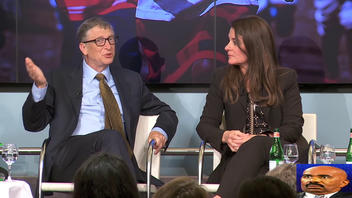
Did Bill Gates explain how he injects GMO in little kids arm right into the vein? No, that's not true: While this is a real video clip of him speaking, he was making an analogy that he believes the safety of genetically modified crops should be tested before becoming part of the human diet just as vaccines are tested before being given to children.
The misleading claim resurfaced as a video clip published on the Youtube channel 'NASA Going Nowhere Since 1958' on May 10, 2020, with the title "Bill Gates Explains How He Injects GMO in Little kids Arm Right into The Vein" (archived here). The description read:
On Thursday (22 January), Bill and Melinda Gates spoke to a Brussels audience, which didn't appear shocked by their endorsement of Injecting Genetically Modified Organisms in Little kids.
Gates fortune was $64 billion in 2014. Since he so kindly started giving his money away his fortune is now $120 billion. Bill Gate is Satan's soldier on a mission to destroy human lives and spread misery and suffering on Earth.
This is what social media users saw:
This is what Bill Gates said in the 17-second clip:
You know, Is there something to worry about with medicines, that is: Might some of them have side effects? Do we need safety testing? I mean and we are taking things that are, you know, genetically modified organisms and we're injecting them in little kids' arms we just shoot 'em right into the vein.
The video appeared to be taken from one uploaded by Euractiv "
The Euractiv caption opened:
On Thursday (22 January), Bill and Melinda Gates spoke to a Brussels audience, which didn't appear shocked by their endorsement of GMO crops.
The Euractiv description went on to summarize some points in the video, as well as some that were not included in the 7:26 minute long video segment. This story about Melinda Gates' 2012 visit with a Tanzanian farmer named Joyce is not included in the video:
In the letter, the Gates advocate "innovative farming". An example provided is that when Melinda visited Tanzania in 2012, a local farmer named Joyce spoke to her "with the zeal of a preacher giving a sermon."
"That year, for the first time, Joyce had planted a new kind of maize seed, bread to tolerate drought. When drought came, most of her crops withered and died, but her maize was more productive than ever. She sold the surplus to buy beans and vegetables and other nutritious food for her family, and had money left over to pay her children's school fees. "That seed," she said, "made the difference between hunger and prosperity," the letter says, adding:
"Joyce's story, multiplied by hundreds of millions of African farmers like her, is the reason innovation in agriculture is so important."
Topics included in the video segment include crop resistance to drought and rain, increased productivity, farmer's access to markets, to market prices and transport, credit to buy fertilizer, growing crops with more nutrition, and more calories and diversified calories from a variety of crops. On multiple occasions both Melinda and Bill Gates emphasised sovereignty, that the African countries and farmers have the right to decide what to do with their crops.
Many of the agricultural practices and issues they mentioned had nothing to do with GMO crops, something they pointed out. At 01:28 minutes into the video, Melinda Gates explains that of approximately $400,000,000 of their agricultural investments, less than 5% of that is for GMO crops. She then speaks about rice crops and the need for them to tolerate rain, before Bill Gates steps in at the 02:08 minute mark. Just after he begins speaking is where the part that has been taken out of context can be found.
The full transcript of what he said about GMO crops is:
The strongest analogy is to medicines and you know; Is there something to worry about with medicines? That is: Might some of them have side effects? Do we need safety testing? I mean, we are taking things that are, you know, genetically modified organisms and we're injecting them in little kids' arms- we just shoot 'em right into the vein.
So, yeah I think maybe we should have a safety system where we do trials and test things out. The idea though that you would take a technique, that promises to solve nutrition problems, solves productivity problems, solves crop disease problems for African farmers, where is is absolutely a life and death issue for them- and you would say, "Oh, nothing that uses that technique, should possibly be used."
It's so random, the what's considered a GMO and what's not considered GMO. Irradiating things and making... having multiple chromosomes, that's not GMO. Whereas things where you intentionally insert in things in a very careful known way, that is GMO. And in fact, you can't even tell once you have the results, the idea of which, how it was derived. There is no natural being who can create exactly those same, those same things.
So I do think the Africans ought to have a sovereign right. Take cassava disease. It is spreading throught the continent. It's a very important crop. There is, in the labs being worked on, a GMO cassava that will stop mosaic disease. And should African countries be told, "No. uh you know- Let that disease run rampant! It's OK, it creates starvation and malnutrition."
Bill Gates, who has pledged about 95 percent of his huge fortune to charity, is often villainized for his philanthropy. Here are a few of the most recent Lead Stories debunks of fake claims against him:
Fact Check: Bill Gates Did NOT Say On CNBC TV He Will Make $200 Billion On Vaccinations

















